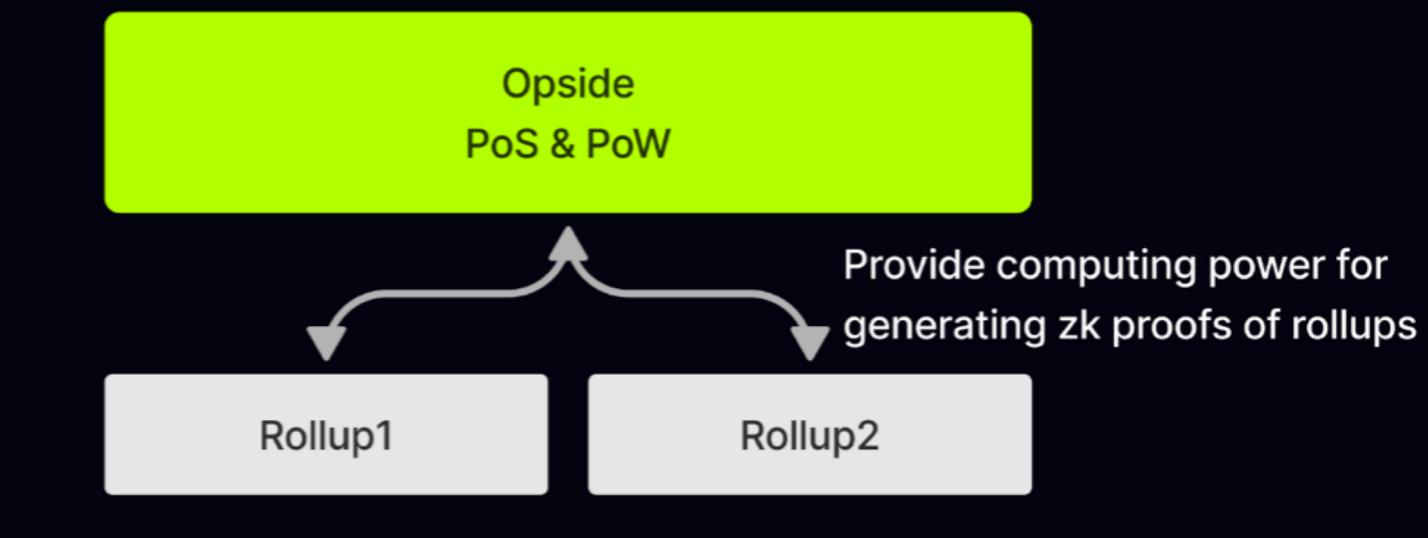NGC Ventures:我们为什么投资Opside?
原文作者:Henry Zhang
Opside 是一个去中心化的ZK-RaaS (ZK-Rollup as a Service)平台,也是业内领先的ZKP(零知识证明)挖矿网络。Opside 采用 PoS & PoW 混合共识,为Web3开发者提供了一键生成 zkEVM 应用链的功能。同时,这些数量众多的ZK-Rollup带来的ZKP 计算任务也产生了巨大的算力需求,从而为全球矿工提供了一个有意义的挖矿场景,填补ETH 抛弃 PoW 之后留下的海量闲置算力。
1. ZK 与RaaS(Rollup as a Service)的天然契合,可以带来更好的开发者和用户体验
作为目前最为主流扩容的方案,Layer2 增强了以太坊的可扩展性。开发者们也开始追求成本更低、性能更高并且可以满足一些定制化需求的区块链,这种需求将随着市场发展而相应扩大。以应用链的方式增强应用本身治理代币价值捕获,是针对该问题的一个重要发展方向。RaaS 便可以成为该需求的一种解决方案。
目前主流的RaaS 服务,大多数基于 optimistic rollup,这是由该类方案门槛低、高兼容性所决定的。然而,因为 ZK-Rollup 技术带来的更高安全性、互操作性和 finalitytime,我们也一直看好 ZK-Rollup 的发展。Opside 提供的ZK-RaaS,实现了对于ZK-Rollup 的底层技术友好性,在安全性、提现速度等诸多方面有显著优势。

Opside提供了一个模块化的RaaS 解决方案:
Opside Chain:既是共识层,也是数据可用层,所有产生的交易和数据将在Opsidechain验证打包上链和存储。交易速度快,手续费低。
Rolluplayer:基于 ZK-Rollups (尤其是zkEVM)的执行层,每一个应用都可以拥有自己的一条zkEVM 链。这些ZK-Rollups由一个统一的系统合约来管理,他们拥有相同接口规范和数据结果,从而可以实现原生的跨 rollup 通信。
2. 精巧的代币经济学激励,保持去中心化与PoW算力支持
Opside 整体采用的是 PoS + PoW 的混合共识。参与角色为PoS中的Validator 和PoW中的Miner,Validator 本身还作为Rollup的Sequencer 来并获取相应收益。具体如下:
OpsideChain
PoS:Opside 将采用以太坊 2.0 的 PoS 算法,并对其进行必要的改进。因此,Opside 的共识层将拥有超过 10 万个 validator。任何人都可以持有 IDE 代币并成为 validator。validator 可以获得区块奖励和 gas 费用。
RollupLayer
PoS (Sequencer):validator 不仅提议Opside区块,还提议 Rollup区块 (即 data batch)。因此 validator 同时也是 rollup 的 sequencer。sequencer 可以从Rollup交易中赚取 gas 费用。
PoW (Prover):任何人都可以成为 rollup 的 prover(也就是Miner),只要它具有足够的计算能力进行 ZKP(零知识证明) 计算。根据 Opside 的PoW 算法,prover可以自由地为一个或者多个ZK-Rollup 生成ZKP,并获取相应的奖励。
根据PoS & PoW 混合共识,区块奖励分为 PoS 和 PoW 两部分,分别对应 Validator 和 Miner。在 Pre-Alpha 测试网阶段,PoS 与 PoW 的区块奖励比例暂时固定为 1: 2 ,即 11% 的 IDE 被分配给 Validator, 22% 的奖励被分配给 Miner。在未来,这两者的比例会随着整个网络的 ZKP 算力供需关系动态调整。
综上所述,Opside chain采用了 ETH 2.0 的 PoS 共识,将拥有超过 100 k 的 validators。同时 permissionless 的 PoW,将吸引更多的矿工来共同维护安全性。基于 Opside 创新性的经济模型,开发者需支付的是rollup slot 的租金,从而承担 ZK-Rollup 的成本。
3. 一键发zkEVM 链的ZK-RaaS 服务,让规模化和低门槛成为可能
为了开发者更加无痛的通过Opside 的服务建立自己的 Rollup,Opside 已经开发好了十分流畅的前端服务,并实现了:
(1 )硬件全托管。ZK-Rollup 所需的两种硬件资源:数据可用性(类比于硬盘)、zkp 算力(类比于 CPU),分别由 PoS 和 PoW 来去中心化且无需许可地提供。开发者不需要承担任何硬件成本。
(2 )主权。开发者拥有 ZK-Rollup 的主权,可以自定义 rollup 经济模型,甚至可以把gasfee设置为0 。
(3 )EVM 兼容。开发者可自由选择多种类型的zkEVM SDK,可选项包括PolygonzkEVM,scroll,zkSync,StarkNet 等,基本没有应用的迁移成本。
通过这些服务,开发者可以十分便利地生成属于自己的ZK-Rollup(尤其是zkEVM),并且得益于gasfee 的自主设置,可以推动 fullyon-chain 应用的进一步普及。
4. 持续、专注的ZK 开发者团队,更强的产品交付能力。
团队基本全都具有几年的区块链领域经验,并且对于Zk 技术有着长期的研究。因此对于 ZKRollup 的技术开发,团队有着很强的执行力和功底。



